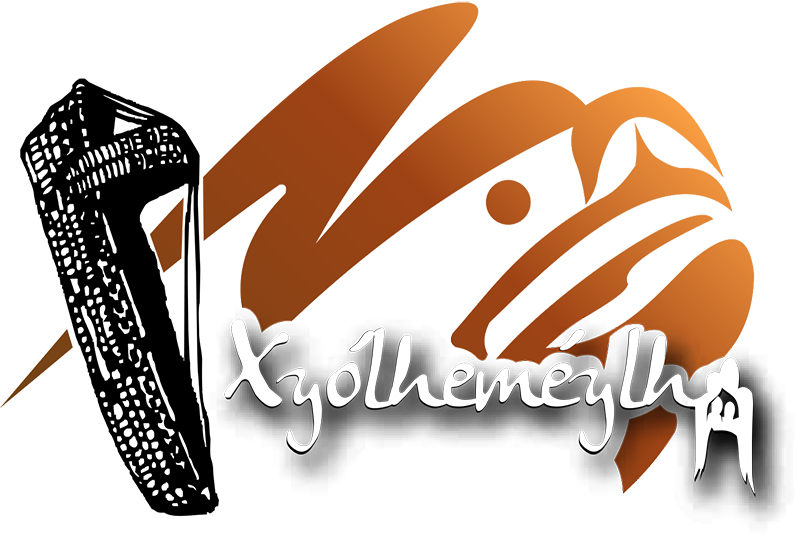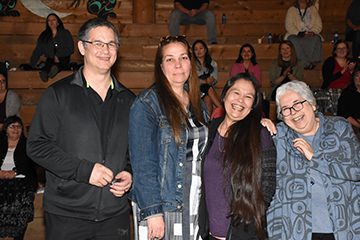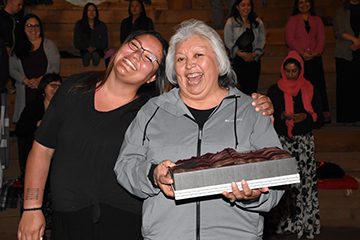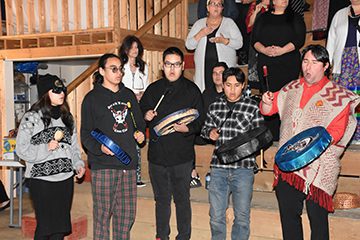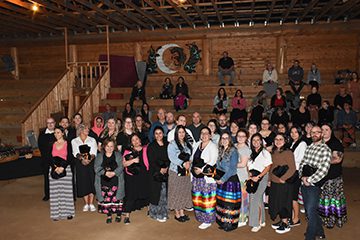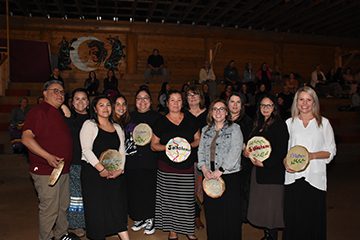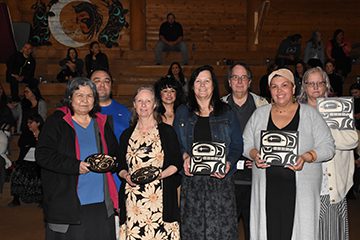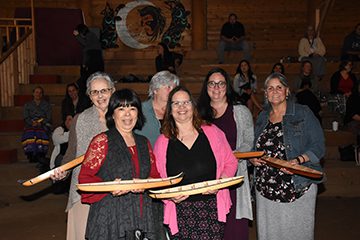Message from the board of directors
Fraser Valley Aboriginal Children & Family Services Society
Sqwélqwel - Xyólheméylh Summer 2023 Newsletter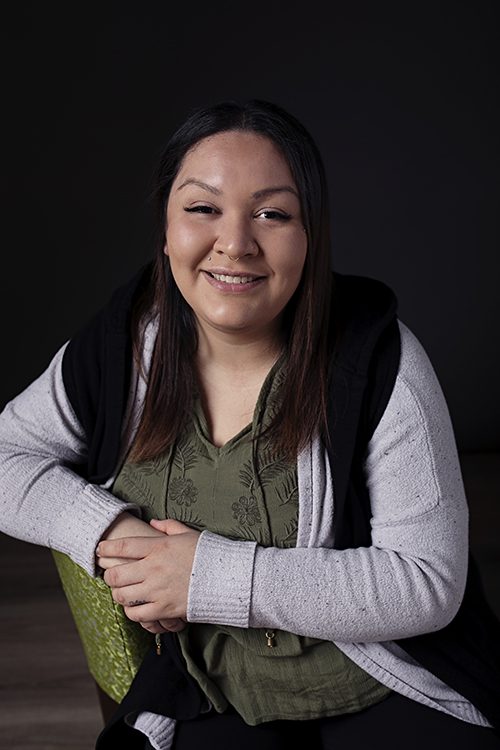
Board President Jennifer Janik.
Xyólheméylh Board of Directors President’s Message
Ey Swayel – Good Day,
Welcome to our Summer newsletter!
We had a busy Spring. In late April we were able to gather together for the first time in three years to honour our staff. We gathered at the Semath Longhouse, shared a meal and honoured all our staff, as well as the staff who reached a years of service milestones for the last three years. You can see photos from the event in this newsletter.
We also honoured our children and youth in care by holding an event during BC Child and Youth in Care Week. National Indigenous Peoples Day was on June 21st. This day is a day to recognize and celebrate Indigenous culture. I hope everyone was able to partake by attending one of the many events in BC.
Later this summer we will be holding a Naming Ceremony for Xyólheméylh on September 13. Xyólheméylh is the Halq’emeylem word that was given to us by the Elders upon our inception. It describes the special relationship between someone who requires care and someone who provides that care. It is our preferred name, rather than Fraser Valley Aboriginal Children and Family Services Society which was given to us by MCFD. The Naming Ceremony will be an opportunity to recommit to the name of Xyólheméylh and breathe new life into it.
We are hosting a number of events this summer for children, youth and families. Our popular Setting the Table events are back this year every second Thursday in July and August. We are also hosting virtual Indigenous art workshops, a Lacrosse program for children and youth in care, and later this August, Visions and Voices will be hosting their annual Soccerpalooza tournament. Please see the details for all these events further down in this newsletter. Also, later this summer we will also be team building with the Elders and embarking on the strategic planning process.
Melath’i:yatel – Jennifer Janik
President, Xyólheméylh Board of Directors
Message from Executive Leadership Team
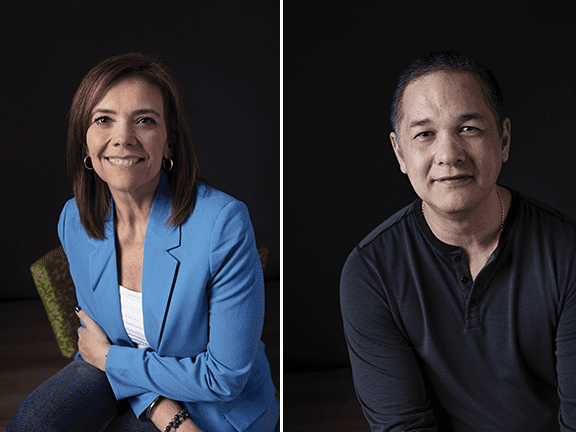
On April 27 we held our first in person Staff Appreciation event in three years. It was good to be able to gather again in the Longhouse, share a meal and express our appreciation to our hardworking, dedicated staff. We were joined by members of our Board of Directors and the Elders Advisory in celebrating and recognizing our staff. At the event we also recognized over 80 staff who reached years of service milestones during the past three years. You can see some of the photos from the event further below in this newsletter.
In May our Mission staff moved out of the St. Mary’s location and into new offices on Lougheed Hwy. This was the last of our offices that were still located in former residential schools. Work continues to locate unmarked graves at St. Mary’s Residential School in Mission, as well as Coqualeetza Residential School in Chilliwack and All Hallows Residential School in Yale. Our hearts go out to all the communities and families as we learn of more unmarked graves.
In June we celebrated National Indigenous Peoples Day with an art contest. We received so many wonderful submissions that touched our hearts and lifted our spirits. Thank you to all the children and youth who participated, and the teachers who facilitated the project. Rather than ranking the art, we sent everyone who participated a small gift and we will be displaying the art in our offices.
This summer we have a number of events. Our Setting the Table gatherings are returning this July and August, every two weeks with the location alternating between Abbotsford and Chilliwack. The events are opportunities to share a meal and teachings such as making medicine pouches and Slahal. We are also offering virtual Indigenous art lessons with Coast Salish artist Ovi Mailhot; a Lacrosse program for children and youth ages 6 to 16; and the annual Visions and Voices Soccerpalooza event in August. Details on all the events are further below in this newsletter. We are looking forward to seeing many of you at these events this summer.
Kyla Darby and Rod Spitzig
Meet a Caregiver jennifer aucoin
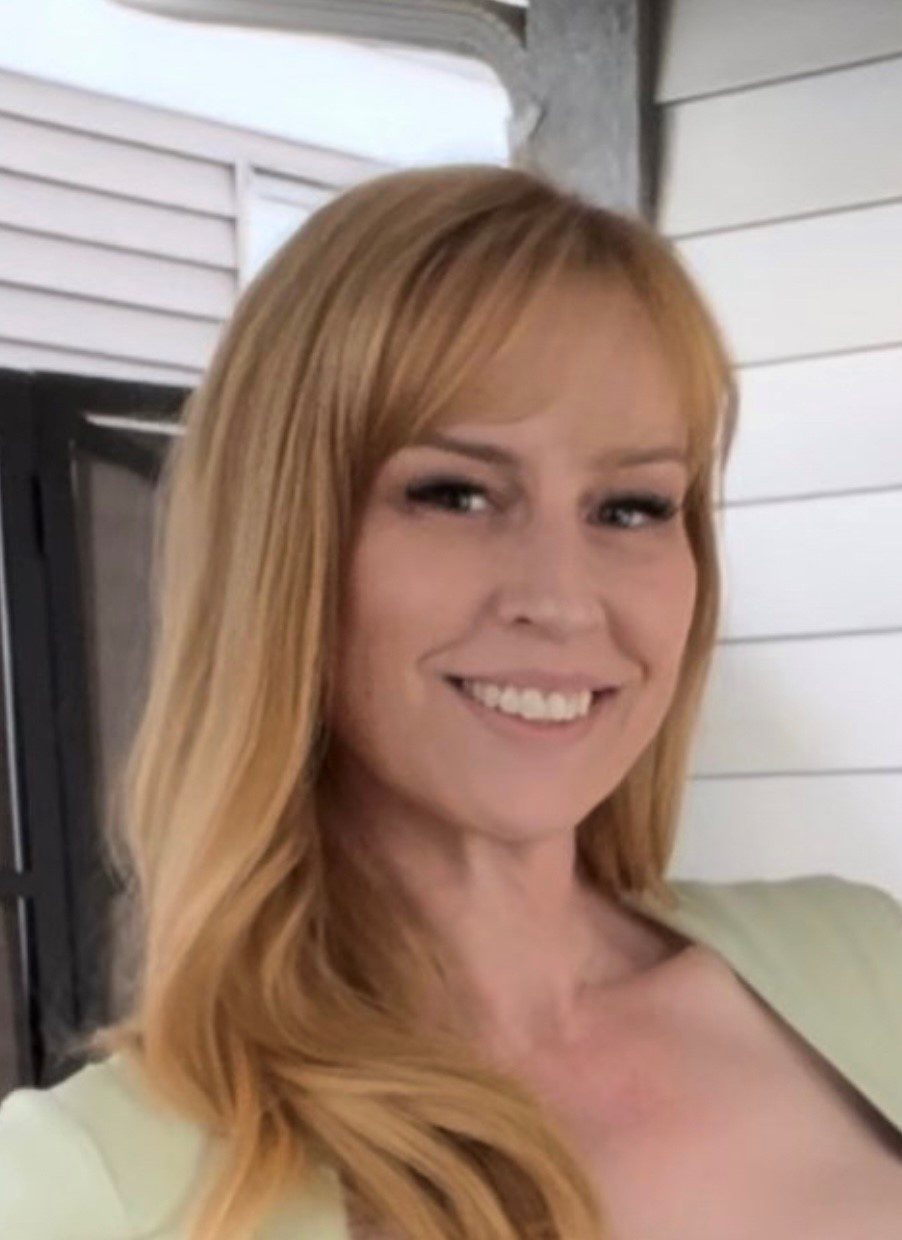
Jennifer Aucoin became a caregiver by accident. Approximately 15 years ago, she was a jewelry maker and was taking a course on making dream catchers. She met a pregnant woman in the class. “It was raining so I gave her a ride home and then once a week I would pick her up and drop her off to her job in Mission .She didn’t talk to me very much, she had her baby and three or four months after the baby was born she called me and told me the baby had been apprehended and she didn’t know anyone else in Abbotsford and asked if I could take him. So, I started as a restricted home for that child and I just went from there,” says Jennifer. Since then, she has cared for many children for Xyólheméylh, some for short periods and others longer term, while also working full-time as a registered nurse.
She currently has four children in care – ages eight, 10, 12 and 13. This is in addition to five children of her own,– ages 12, 15, 20, 23 and 27. “When you take kids in, I found over the years, it’s been hard, but it’s very rewarding as well. It can be fun introducing them to things they’ve never done before, like camping. I have felt like I’ve made a difference in their lives and it feels good,” says Jennifer.
She has had a few kids age out of care with her and they come and visit with their own children. “I feel like I’m part of a big family. When you take kids in and the mother or the parents get the kids back and it’s a good situation, it’s rewarding to see that happen,” says Jennifer.
She also feels that the experience has made her own children better people – more tolerant and well-rounded and that they, as non- Indigenous kids, have benefited from being exposed to Indigenous culture. She believes that culture is very important and the family has attended many ceremonies, sweats, pow wows and medicine walks over the years. She says it also makes the Indigenous children feel connected to their community. “Everyone wants to feel connected and part of something. Indigenous people are so welcoming and inclusive,” says Jennifer.
“Fostering was something I never thought about, it’s just been a path my life went on but it’s been an amazing journey and my life has changed so much. It was such a great thing that happened, picking up that lady changed my whole life,” says Jennifer.
We thank Jennifer and all Xyólheméylh caregivers for opening the homes and hearts to children and youth who need care. If you are interested in becoming a caregiver we have info sessions the 2nd Wednesday of the month at 6:30 pm and the third Tuesday of the month at noon. Contact Norma Commodore at norma.commodore@xyolhemeylh.bc.ca to register.
Meet a Board Member: Phil Hall (Salacy-a-til)
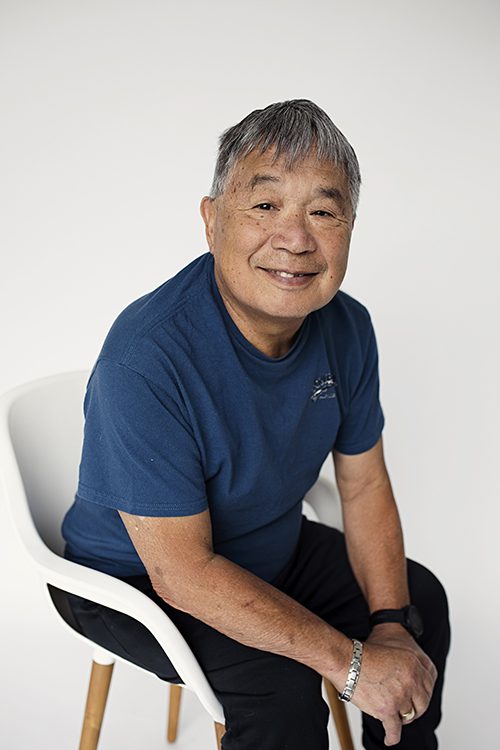
Phil is from the Skowkale First Nation. He has almost 50 years of experience working for Indigenous communities. He has been the Manager of the Chilliwack Area Indian Council for 14 years; a past Chief of Skowkale First Nation for eight years; was elected to two terms as Alderman with the City of Chilliwack; a health worker for the Assembly of First Nations; and an engagement worker with First Nations Health Authority. He just retired from being the Manager of the Coqualeetza Cultural Education Centre. Phil comes from a long line of family members who have been active in their communities. His dad was Chief of Skowkale and his grandfather was Chief of Tzeachten.
Phil wanted to be a Xyólheméylh Board member because he wants to be part of the positive momentum the organization has been making towards its strategic goals, cultural values and the increased role of Elders. “Cultural values play a key part in any Aboriginal family,” says Phil. “These values need to be at all levels, whether it’s in schools, our organization, ceremonies and events.”
Phil also believes that Xyólheméylh staff have a key role to play. “Our communities have opened up to more linkages, communications is key, staff have a responsibility to the communities and to themselves, to respect the community and the values,” says Phil.
He says it’s important for staff to go into the communities with an open mind and to have open dialogue. “It’s people that make the organization, the bottom line is that staff are up against heavy duty situations with families and youth. It’s a heavy burden,” says Phil. That’s why he was particularly pleased to attend a staff appreciation event in April. “It’s important to have gatherings, share a meal and to know the organization and the Board support them,” says Phil. “My role is to support the staff, not to tell them what to do or how to do it, but to support them.”
Phil has a son and a daughter and three grandsons, one of whom he coaches in soccer. In fact, soccer and sports in general are a big deal in the Hall family. In addition to coaching soccer (he once coached a soccer team that played in a tournament in Germany) he also plays golf twice a week.
New feature: Si:yólexwe teachings
Meet an elder: roger andrews
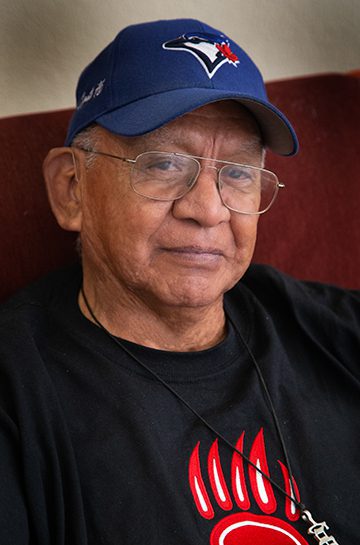
Roger is known for his mischievous sense of humour and his story telling. For many years he was the only male member of the Elders Advisory Committee with Xyólheméylh. He joked that he had some explaining to do with his wife Audrey about why there were so many women in his contacts list on his phone.
Roger is from the Shxw’ow’hamel First Nation located in the Upper Fraser Valley near Hope. He was the youngest of six children to Joseph and Lillian Andrews. In the 1940s, through shady actions on the part of the government, the Andrews lost their status. They moved from Agassiz to Yale. Because they didn’t live on reserve, Roger and his five sisters managed to avoid getting sent to residential schools. In grade 10, Roger quit high school to become a logger in Washington, where he worked for seven years.
Roger grew up fast, met his wife Audrey and had five children together, in addition to two children he had with his first wife who passed away. He jokes that his parents told him not to get married to anyone from Shxw’ow’hamel as they might be related so he thought he was safe getting married to Audrey. It turned out her family was originally from Shxw’ow’hamel as well, but fortunately not related. In the early 80s, he and his wife came back to Shxw’ow’hamel where Audrey became Chief and successfully lobbied the federal government for recognition and funding.
Roger says, “We had a good life together.” He notes that in 2010 they were named King and Queen of the Elders in BC. He jokes it was only because the other six couples who were nominated declined. It turned out to be a very busy year of travelling throughout BC. Audrey passed away in 2020, but he is still surrounded by his children and their children, now 41 grandchildren in total. “I’m very rich,” says Roger. He says he is motivated by the love of his family and is happy to see culture getting stronger and the language being revitalized. “People are getting more involved with the culture and communication is getting stronger.” He says that unlike when he was a child, his grandkids tell him they love him all the time, and he makes sure to let the children know they are loved. “That’s what’s keeping me alive.”
Roger became a story-teller when he got involved with Xyólheméylh about ten years ago. “I could hear what the Elders were going through, they were worried about children, so I started telling stories to make them feel better.” He especially likes telling his grandchildren what it was like in the 1950s with the clear air and being able to fish and hunt anytime they wanted.
He says that his community tends to work out problems themselves and credits the Care Committee and the strong community for children being able to stay with family. He says that several children have returned home to Shxw’ow’hamel from living on Vancouver Island and that they are thriving and learning the culture. “I’m so proud of them,” says Roger.
Medicine Teachings with the Elders: Dandelion
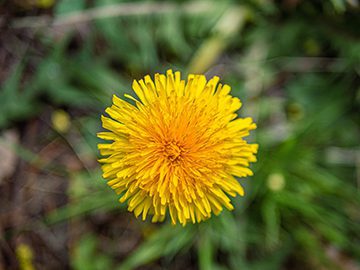
Dandelion is a survival plant, meaning the whole plant can be used. The flower can be infused with oil and made into a salve to be used topically, says Cynthia Myran, Xyólheméylh Elder. The salve can be used to treat pain, arthritis, skin infections and as an anti-inflammatory. The leaves can be eaten and are highly nutritious and both the leaves and roots can be made into a tea which is good for the liver, for the heart and skin.
- Cynthia Myran, Xyólheméylh Elder
a story to entertain
In this video Rupert Richardson tells an entertaining story. Rupert is from the Guskimukw, Nuxalk, and Chippewa First Nations. He is a PhD candidate at UBC and has worked in the field of education for 15 years. His research and community engagement centres around intergenerational healing, decolonization and post-secondary education.
community spotlight: Ch'iyaqtel's community garden
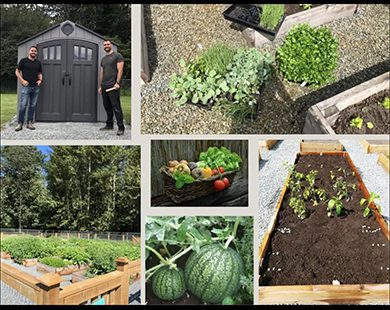
Tzeachten began their community garden in 2018 and promote it within their community to increase awareness and interest in food production. There are 18 garden beds, each 18 x 4 feet. The garden is the passion of Councillor Loren Muth who together with some maintenance and housing staff support the garden through site preparation in the spring and throughout the growing season.
In 2019 Tzeachten achieved a grant through FNHA to expand the community garden program into food security. With this money they constructed a 40 x50 foot greenhouse. The Greenhouse and garden combined would only require one dedicated part time worker to run successfully.
In the greenhouse they grow a range of produce including strawberries, lettuce, peppers, tomatoes, and cucumbers. Additionally, they grow some tropical plants such as lemons, calamansi, avocado, banana, date palm, pomegranate and feijoa just to showcase what could be grown in our climate.
In total the garden and greenhouse area take up about half an acre, however the benefits to the community outweigh the land use allocation. They distribute all produce to community members through delivery or pickup points. This ensures members have free access to fresh produce throughout the spring to fall. They currently don't sell any produce and have used this to be a strictly community initiative however as the program continues to grow, they will look at the potential of selling excess produce.
"The goals of the food security program and gardens are to ensure our community has access to safe, spray free produce that is fresh and healthy. Our hope is that we can eventually grow enough to support the produce needs of our community throughout the summer and into the winter months," says Loren Muth. "Another goal of the program is to bring our community back to the land, to get their hands dirty, learn, see how much fun gardening and growing food can be and that anyone can do it whether they have experience or not."
"Personally, my passion is in food production," says Loren. "I love to see how food and plants can change an environment, both social and physical. Hearing how much a member or child enjoyed something they grew or that came from the community greenhouse makes it all worth it. I also find its a great way to bring community together around a common goal, produce food, offset costs, and just enjoy being outside with nature.”
Recipe: baked bannock
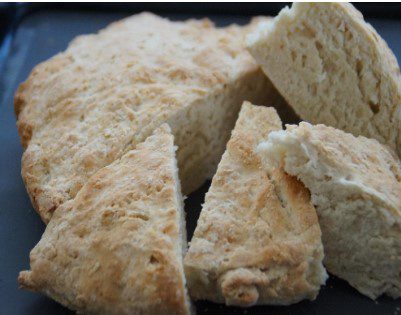
The following recipe courtesy of Fraser Valley Métis Association.
- 3 cups flour
- 1 tsp salt
- 2 tbsp baking powder
- 1/4 cup melted butter
- Approx 1.5 cups water
- Mix all dry ingredients together
- Stir in wet ingredients with fork
- Don't over mix
- Knead about 10 times
- Form 1" thick
- Bake 350 degrees for about 20 mins . Use parchment paper on pan to prevent sticking
Enjoy!
Visions and voices
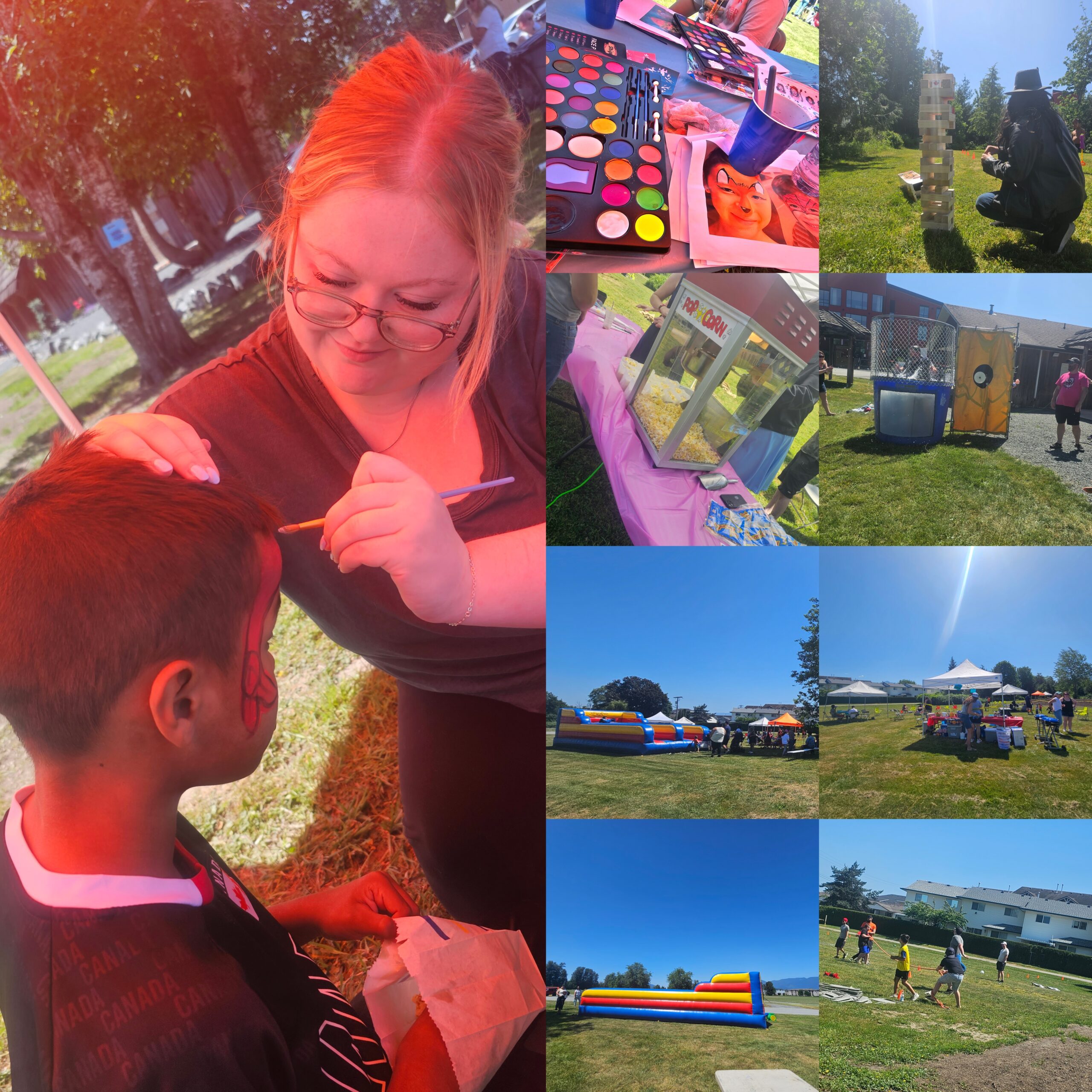
Our Visions and Voices Youth Advisory Group organized a special event on June 3 in Chilliwack. Celebrating YOUth was held in conjunction with BC Children and Youth in Care Week and included fun activities such as racing your social worker, face painting, a BBQ and prizes. Over 100 children and youth participated in the event
Visions and Voices also wrapped up Ribbon Skirt Workshops in June which were very successful. Upcoming programs include a beading program at the end of April, a BBQ in Chilliwack for BC Children and Youth in Care Week during the first week of June, building a sweat lodge at the end of April at Soowahlie First Nations, supporting Setting the Table events in the summer, and starting a lacrosse team which will play in August. They are also organizing their annual Soccerpalooza in August and the annual forum which is an overnight retreat from November 17 to 19. Stay tuned for details on all these events by checking our website or following us on Facebook.
XyólhemÉylh's staff appreciation event
On Thursday, April 27 we held our first in person Staff Appreciation event in three years. The event was held at the Sumas Longhouse with 80 plus staff receiving gifts for years of service milestones.
Elder Lou Silver Kaarsemaker addressed the staff on behalf of the Elders Advisory. "It is hard work, I know it's hard, I've been there. It's important to take care of yourselves. You have to learn how to find self care, whatever it may be ... you have to find a way to last as long as Elly," referring to Elly Janik who was honoured for 30 years of service.
Rod Spitzig, Executive Director of Administrative Services said, "I raise my hands to all you and thank you for everything you do."
national Indigenous peoples day art contest
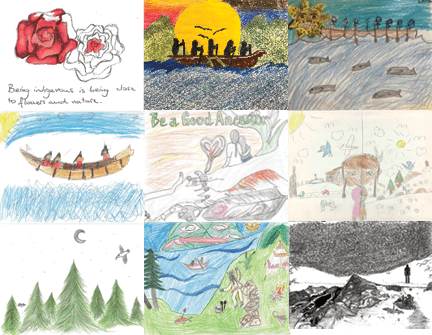
Thank you to all the children and youth who entered our National Indigenous Peoples Day contest! We received 67 wonderful entries and everyone who participated received a gift certificate. We will be displaying the art in our offices as well as publishing some of the entries in our Annual Report and other publications. Pictured above are some of the artwork that was submitted.
Upcoming Events: Indigenous Art Classes
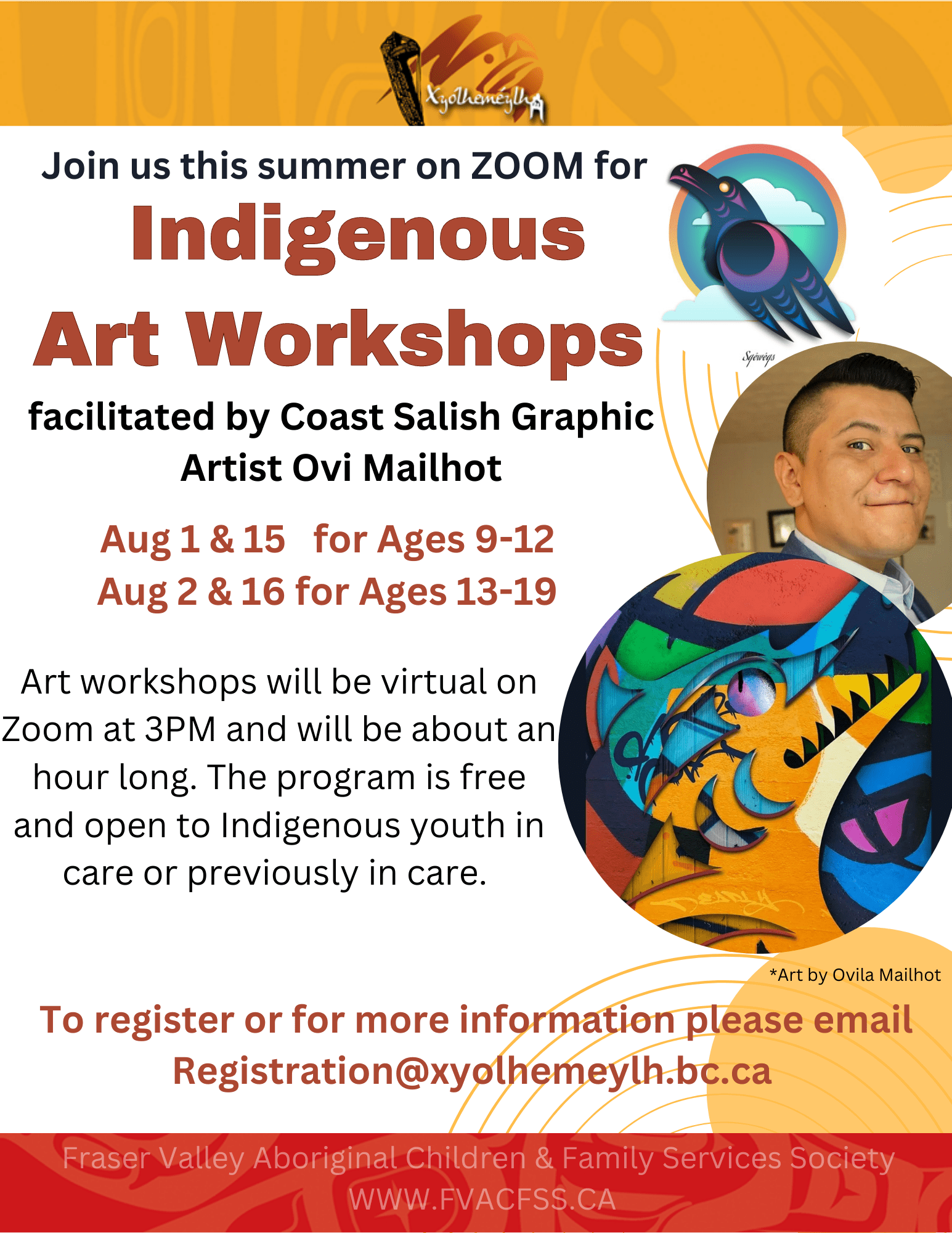
Upcoming Indigenous Art Virtual Workshops with Coast Salish artist Ovila Mailhot.
Youth will learn basic forms and create Indigenous Art. No experience is necessary. Only supplies needed are paper, pencil or something they are comfortable drawing with.
The program is free and open to any Indigenous youth in care or previously in care. To register email Registration@xyolhemeylh.bc.ca
Upcoming Events: Setting the Table
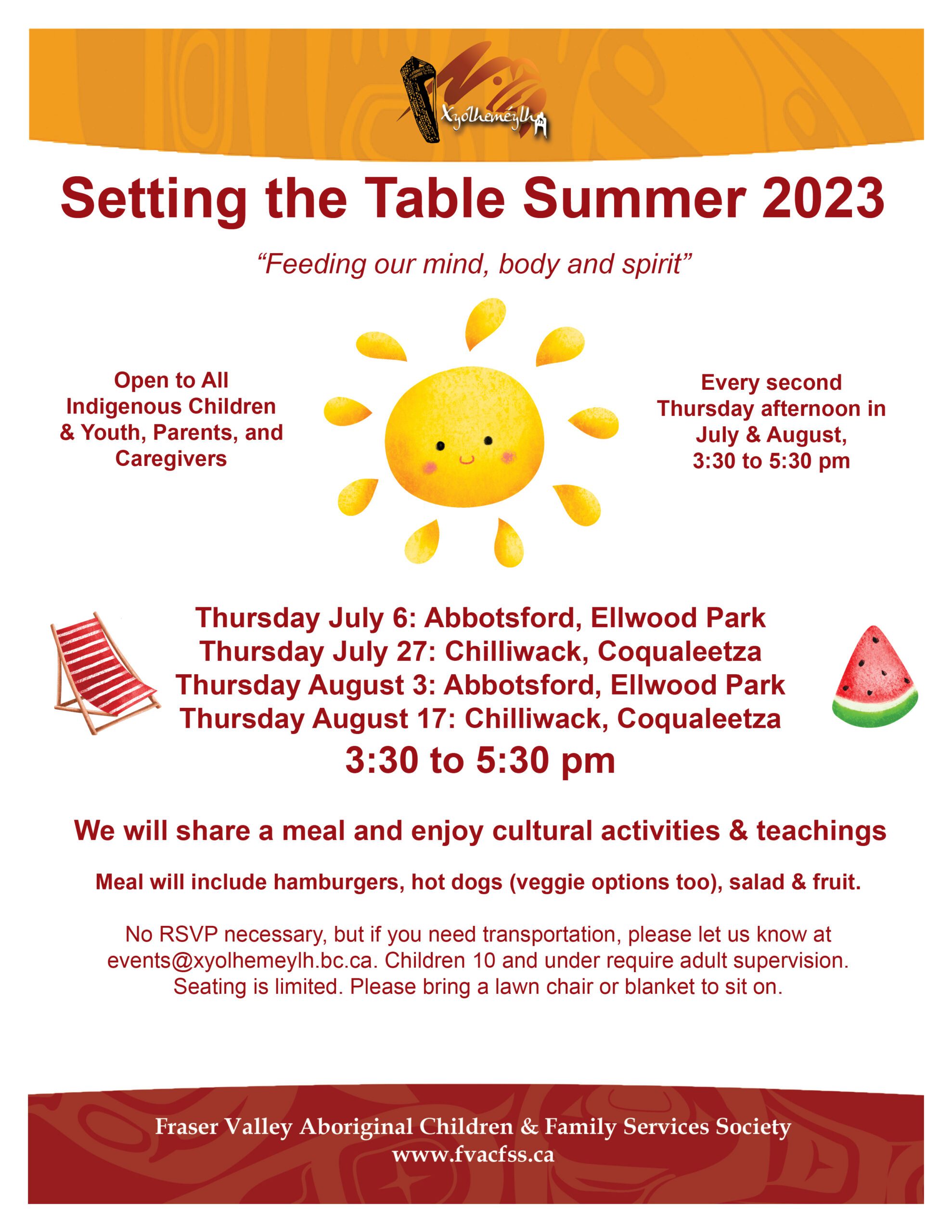
Join us this Summer every second Thursday afternoon from 3:30 to 5:30 for a BBQ, cultural activities and teachings. Open to all Indigenous children,youth, parents and caregivers. The event alternates between Abbotsford and Chilliwack. No RSVP necessary. Children 10 and under require supervision. Bring a lawn chair or blanket to sit on.
Upcoming Events: Lacrosse

Open to all Indigenous Children and Youth, ages 6 to 16. Thursdays, 9am to 11 am. July 20 to August 10. Learn how to play Lacrosse or practice your skills. Gear, equipment and teachings provided. Register by July 11 to visionsandvoices@xyolhemeylh.bc.ca
Upcoming Events: Soccerpalooza
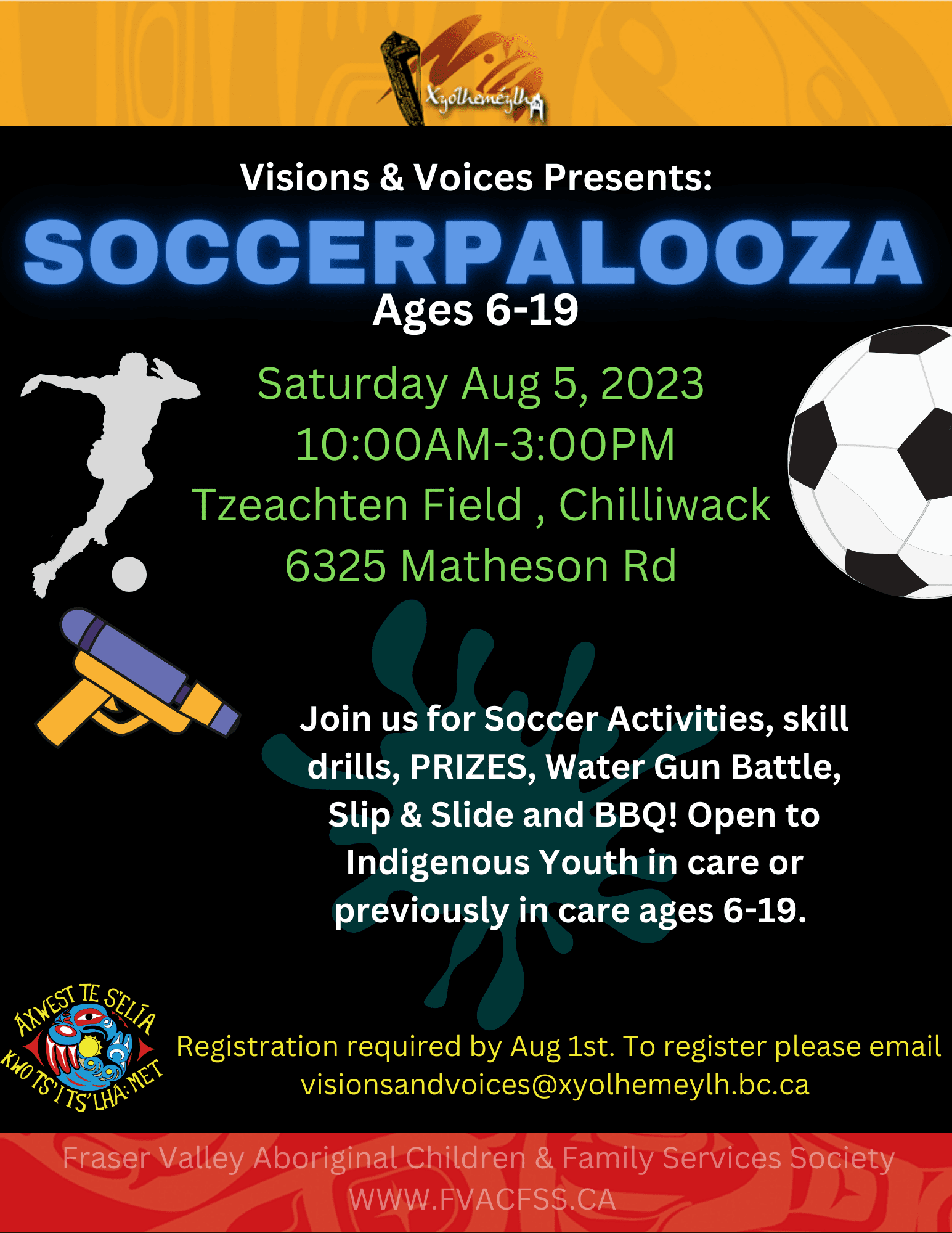
Open to all Indigenous Children and Youth, ages 6 to 16. Thursdays, 9am to 11 am. July 20 to August 10. Learn how to play Lacrosse or practice your skills. Gear, equipment and teachings provided. Register by July 11 to visionsandvoices@xyolhemeylh.bc.ca
